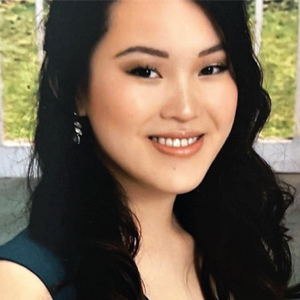Emily Cheung: Discovering dynamism in flexible career paths
While many new grads don’t have a lot of work experience to list on their resumes, Emily Cheung (BA’17) feels she had an edge: volunteering.
In a Zoom interview, Cheung opines that what helped her “stand apart” from others when applying for jobs was being able to fill her CV with her student volunteer experiences. As an undergrad, she was extremely immersed in UBC life, including being a member of the Arts Undergrad Society.

Graduation, however, meant disconnection from that community. Missing that feeling of involvement, she contacted UBC to find out how she could contribute and wound up speaking at four alumni events, including the Art of Landing a Job.
When she was asked to be a keynote speaker at an event about networking, she was pleased to reunite with people she had worked with during her student-government days. Yet what she found particularly notable was being asked to be the keynote speaker when there were others whom she considered to be more fitting than her “pretty introverted” self.
In fact, Cheung says she experiences “scary anxiety” when facing the prospect of networking. She has since discovered, however, that quantity isn’t always necessary when it comes to networking. Instead, she thinks that having at least one or two key connections is important, adding that even LinkedIn contacts can help.
After one of her talks, she received thanks from an introverted student who had struggled with networking.
Cheung notes that “we have closed our social circles a lot” during the pandemic, so she finds these alumni opportunities help her to break out of her everyday routine and encounter new situations and people.
Venturing out of comfort zones and into unfamiliar territory was a main theme in Cheung’s talk, according to fourth year psychology major Mary Falade.
“The fact that she had done marketing jobs across so many types of industries, from non-profits to gaming, really underscored this point,” Falade says. “She helped me realize that I shouldn’t frame the unknown as something I haven’t learned but to approach it instead as something that I could learn.”
Falade thinks this outlook is useful when searching for employment.
“During the job search process, many students, including myself, tend to restrict themselves by focusing on the skills they already have instead of the skills they want to build,” she says. “UBC alumni have taught me to apply for jobs and other opportunities even when I feel like I might not be perfectly qualified, because it’s just another chance to learn something new.”
Illustrating this point, Cheung says that her “unconventional path” of working in a field seemingly unrelated to her political science studies piqued the interest of students.
In job interviews, however, Cheung found that no one ever asked about her political science background. Rather, employers have always focused on her ability to research, write, and present information to others. In other words, her career success has been based more upon her skills than what she studied.
“If you feel like your degree isn’t super relevant to the job that you’re applying for, you shouldn’t be too concerned, because it’s not really about the name of your degree or the specific degree itself,” she says. “It’s more so what you got out of it and what you can apply.”
After hearing alumni volunteers like Cheung talk about their careers, Falade now has a new perspective of what may lie ahead for her.
“One big difference I have noticed in myself is that I am much more flexible with my academic and career path, as I’m now aware that there are so many different ways for me to achieve my goals,” she says. “I’ve learned that it’s okay to wander a little and explore on your way to your destination.”
She feels that attending alumni networking events has helped her clarify her interests, values, and goals — both academic and professional.
Similarly, third year cognitive systems co-op student Sarah Sadh feels she has gained insight into what her life after graduation could look like. After attending several alumni events (and having information interviews with alum Tim Wong, whom she credits with providing “really actionable advice”), she has particularly valued the willingness of volunteers to share their stories, including their mistakes and struggles.
With the pandemic adding another layer of unpredictability to future outlooks, Sadh says she finds reassurance and comfort in how candid alumni have been when talking about their careers.
“I feel that these events are especially important during these uncertain, ever-changing times,” she says, and adds that she is now looking forward to embarking upon her own journey.

